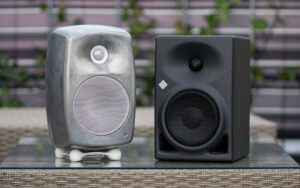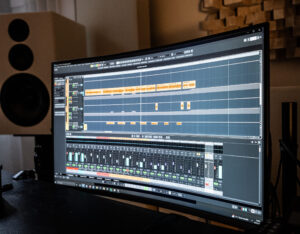For a good start we present you with these 5 tipps that can help you improve your sound mixing and mastering and make your songs sound PRO.
Double your editing time
Right off the bat the least fun thing to do after recording is one of the most important. Before you jump into fine-tuning your mix, spend enough time on editing the song and you will make more informed mix-decisions. Chop up your takes to correct timing mistakes and remove unwanted noises as well as silent parts. This goes for drums, vocals, live instruments and anything, really. Being precise and having patience during the editing of your arrangement can turn your mix from Zero to Hero. Make sure the vocals are on beat all the time and doubles voices are exactly corresponding with the main vocal. The further you zoom into the waveform, the finer your adjustments will be. It is not unusual that bars have to be dragged around because most singers are slightly off beat from time to time. Correcting all the ever so slight differences can make your song sound larger than life in the end. Also remove unwanted noises like breaths and pauses in the takes because pauses contain noise that can stack up an become audible when applying effects. Noise gates can save you time but don’t always work perfectly. They are most useful for takes that don’t contain extremely dynamic sources.
Master Compressor-timing
Make conscious adjustments to your compressor’s attack and release time that are in tune with your tracks tempo and style. Pay special attention to the subliminal changes in sound. A longer release time on vocals will make them sound more ducked. Find the sweet spot where the vocals don’t overpower the mix but still cut through. Don’t be shy when compressing. These days many signals will run through 3 compressors or more just during the mixing stage. The more optimal you set you attack and release times, the more gain reduction you will be able to make without flawing the sound. Especially in the digital domain multiple compressors doing 2-3 dB of gain reduction tend to work better than one doing a lot.
To help you master the timing of your compressor, check out our blog post on The one timing trick for the best compressor delay and reverb settings.
Use limiters to tame your mix
There’s a myth that limiters are not to be used during the mixing process and are only to be applied at the very end of the master. That’s pretty far from the truth, because like explained in our mastering FAQ’s, you will have to make your mix sound loud and not just rely on mastering for that. If your rap vocals are not sounding tough enough, you might need a hard limiter that takes away the peaks before running into the softer compressor you were using. You might be able to give your drums the punch they’ve been missing by using a limiter with slow attack times. You might need to tame your bassline with a soft limiter when a compressor isn’t doing the job. Even on singing vocals a peak limiter can make a compressor that comes after sound more natural, because it’s not being hit with strong peaks that make it work too much. The trick is to always keep your mind open and listen to what sounds best.
Sidechaining…?
Sidechaining a compressor means, you are feeding two signals into it simultaneously, one which is being compressed and one which is triggering the compressor. Figuratively speaking this means when you compress a bassline and feed the kick into the sidechain, the kick itself will now be acting as if it compresses the bassline. This will create the opportunity to have both the bassline and the kick dominate the low-end of your mix simoultaniously.
Similarly, a compressor on an instrumental-track can be triggered by a vocal in the sidechain to make the beat and the vocals merge. I sometimes use this method when recording on a 2-track instrumental that doesn’t have a lot of dynamic range left. Try to use a very slight ratio somewhere between 1:1.01 and 1:1.1. Most of the time I will find myself using a ratio somewhere around 1:1.03. If your compressor can not give you those low ratio settings it probably isn’t suited to run an entire bus through it.
Mental Mastery
Oh, this is the most important tipp overall. Making music and mixing is a mental exercise before anything else.
Just like working out your body, your mind also needs experience and training for being able to judge a mix objectively. Every change you make in a mix should be a conscious one and a clear improvement. Good sound is about letting the meaning and inherent soul of the song appear in the mix, not to do what should be done in theory or in a protocol. Some engineers will remain technicians forever because they always follow the theory perfectly but never listen to the music with their heart. Don’t be that guy, follow your heart and your ears when making music, don’t be restricted to what you think you should be doing technically.


